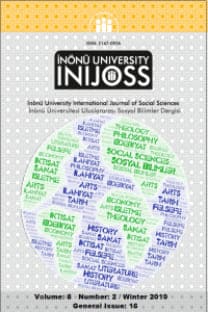ECOLOGICAL CITIZENSHIP IN THE POEMS BY JOY HARJO
Öz
Ecology emerged in the late nineteenth
century in Europe and America although it is Einar
Haugen who created the paradigm of
“the ecology of language” in 1970. The science of ecology looks at nonhuman
nature, studying the numerous, complex interactions among its abiotic
components (air, water, soils, atoms, and molecules) and its biotic components
(plants, animals, bacteria, and fungi). Human ecology adds the interactions
between people and their environments, enormously increasing the complexities.
The aesthetic, spiritual and recreational value for human beings now and in the
future are encompassed in this approach to nature (Baxter, 1999). The ideology
of ecologism involves a reconsideration of the way we think about moral and
environmental matters and what Baxter refers to as human interconnectedness
with the biosphere of this planet. One of the areas of ecology is eco-literacy
which is defined as being the capacity to understand nature’s systems.
Ecologism extends ecoliteracy towards ecological citizenship. The purpose of
this study is to probe the ecological citizenship depicted in the poems by Joy
Harjo who is strongly influenced by her Muskogee Creek heritage. Harjo holds
that she feels strongly that she has a responsibility to all the sources that
she is and has: to all past and future ancestors, to home country, to all
places , to all voices, all women, all tribes, all people, all earth, and
beyond that to all beginnings and endings (Harjo, 2014).
Anahtar Kelimeler:
ECOLOGICAL CITIZENSHIP IN THE POEMS BY JOY HARJO
___
1. Baxter, B.(1999). Ecologism. Edinburgh: Edinburgh University Press.2. Bell, M.M.,(1998, 2005). An invitation to environmental sociology. Thousand Oaks, CA: Pine Forge Press.
3. Bookchin, M. (1990). Remaking society. Boston: South End.
4. Curry, P.,(2000). Redefining community: towards an ecological republicanism. Biodiversity and Conservation, 9, 1059–1071.
5. Code, L(2006). Ecological thinking: The politics of epistemic location. Oxford: OUP.
6. Dobson, A.,(2003). Citizenship and the environment. Oxford: OUP.
7. Dobson, A.,(2004). Ecological citizenship. Paper presented at the annual meeting of The Western
8. Political Science Association, Portland, OR, 11 March.
9. Dobson, A. & Bell, D.,(2006). Environmental citizenship. Cambridge, MA: MIT Press.
10. Dobson,A.& Eckersley,R., (2006).Political theory and ecological challenge. Cambridge: CUP
11. Dobson, A. &Valencia,A., (2007).Citizenship, environment, economy. London: Routledge.
12. Haugen, E. (2001). The ecology of language. In Fill, Alwin & Peter Mühlhäusler (eds.) The ecolinguistics reader. London: Continuum.
13. Harjo, J. (2014). http://www.poetryfoundation.org/poem/175881 accessed January 26,2015. http://www.poetryfoundation.org/poem/179781 accessed January 26, 2015.
14. Jagers, S, Martinsson, J &Matti,S.(2014).Ecological citizenship: a driver of pro-environmental
15. behaviour? Environmental Politics, 23, 3, 434–453.
16. Fox, W. (1990). Toward a transpersonal ecology. Boston: Shambhala.
17. Grasswick, H.(2008). From Feminist thinking to ecological thinking: determining the bounds of community. Hypatia, 23, 1, 150-160.
18. Houser, N.O.,(2009). Ecological democracy: an environmental approach to citizenship education.
19. Theory and Research in Social Education, 37, 2, 192-214.
20. Leopold, A. (1949). Sand County Almanac. Oxford: OUP.
21. Mackie, S. (1998). A school teacher walks about with “green” colored glasses: Three radical ecophilosophies for public educators. Unpublished Masters Thesis. University of Oklahoma.
22. Merchant, C. (1994). Ecology. Atlantic Highlands, NJ: Humanities Press.
23. Miller, D.,(1995). Acknowledging consumption. New York: Routledge.
24. Monbiot, G.,(2007). Heat: how to stop the world from burning. Toronto: Anchor Canada.
25. Naess, A.(1973). The shallow and the deep, long-range ecology movements. Inquiry,16, 95-100.
26. Nash, N. & Lewis, A.,(2006). Overcoming obstacles to ecological citizenship: the dominant social paradigm and local environmentalism. In: A. Dobson and D. Bell, eds. Environmental citizenship.
27. Cambridge, MA: MIT Press, 153–184.
28. NCSS (1994).http://www.socialstudies.org/standards/introduction accessed Jnauary15,2015 29. Sandilands,C. (2000). Raising your hand in the council of all beings. Ethics and Environment, 4,2, 219-233.
30. Shepard, P. (1982). Nature and madness. Athens, GA: The University of Georgia Press.
31. Van Steenbergen, B.,(1994). The condition of citizenship: an introduction. In B. Van Steenbergen, ed. The condition of citizenship. London: Sage.
32. Warren, K. J. (Ed.) (1997). Ecofeminism: women, culture, nature. Bloomington, IN: IUP.
- ISSN: 2147-0936
- Yayın Aralığı: Yılda 2 Sayı
- Yayıncı: İnönü Üniversitesi
Sayıdaki Diğer Makaleler
FICTION OR PRECONCEPTION: THE ‘APE’ ALLEGORY IN ROSE MACAULAY’S THE TOWERS OF TREBIZOND
CLOUD NINE IN RELATION TO EPIC THEATRE
EDMUND BURKE: “REFLECTIONS ON THE REVOLUTION IN FRANCE”1
ECOLOGICAL CITIZENSHIP IN THE POEMS BY JOY HARJO
DISEMPOWERED ‘OTHERS’ AND THE FEMALE SOLIDARITY IN SUE TOWNSEND’S BAZAAR AND RUMMAGE (1982)
BİLGİNİN İMKÂNI VE TEMELCİ GÖRÜŞ
NATURE, CRITICISM OF THE WORLD, AND LOVE IN “DOVER BEACH” AND “LOVE AMONG THE RUINS”
TOPLUMSAL YAPININ OLUŞUMU: BİLİM, DİN VE TOPLUM ARASINDAKİ İLİŞKİLER
